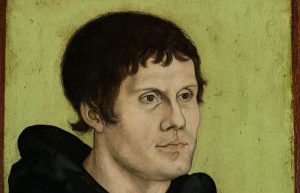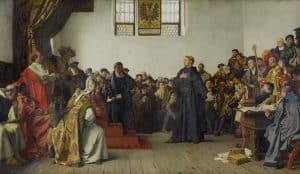Everything that is related to the gospel is worth risking your life for. We need to get off the middle of the fence!
—C. Mark Corts—
If you’re not living I mean really living, you’re dead already.
—Martin Niemoller—
Key point: Salvation is free, but it isn’t cheap. It costs us nothing but demands of us everything. When a person receives salvation through faith in Christ as a free gift, he or she becomes obligated to serve Christ forever. This means taking a stand for Him and what He loves in our spheres of influence.
Dr. Oscar Thompson was a beloved professor of evangelism at Southwestern Baptist Theological Seminary during a portion of my time as a student there. I remember an illustration he gave in class one day about salvation: It is like an offer of food by the state in which one resides. The food is free to all who need it. An individual can come and receive what he needs — but there is a catch. Once an individual accepts the offer of food from the state, he or she becomes the property of the state! Remember, this illustration is presented, not to illustrate anything about government, government policy, or welfare (issues we have discussed at length in other articles at Word Foundations), but to illustrate salvation in Christ. The Lord Jesus Christ is the Perfect Master. Who wouldn’t want to serve Him?
Yet, even as Christians, we hesitate in numerous circumstances, and some of us may even hesitate often, to go out on a limb for Him. We are reluctant to join what Dr. Mark Corts once called the “company of the risk-takers.”
Go Out on a Limb for Christ
 Eric Metaxas is a brilliant writer who has authored biographies of William Wilberforce,1 Dietrich Bonhoeffer,2 and Martin Luther,3 so he knows history well. In an important new book, Letter to the American Church4 Metaxas challenges the American church — Christians, of course, but especially pastors — to speak out against the lies and evil influences currently holding so many in their grip in America today. Metaxas cites parallels between the German church in the 1930s and the contemporary American Church. He warns that if the church fails to actively oppose the evil forces running rampant in “the land of Liberty,” they will overtake it and will lead, without question, to tyranny and unspeakable horrors. We can look at what happened in Germany and see the kinds of things to which silence in the face of evil inevitably leads.
Eric Metaxas is a brilliant writer who has authored biographies of William Wilberforce,1 Dietrich Bonhoeffer,2 and Martin Luther,3 so he knows history well. In an important new book, Letter to the American Church4 Metaxas challenges the American church — Christians, of course, but especially pastors — to speak out against the lies and evil influences currently holding so many in their grip in America today. Metaxas cites parallels between the German church in the 1930s and the contemporary American Church. He warns that if the church fails to actively oppose the evil forces running rampant in “the land of Liberty,” they will overtake it and will lead, without question, to tyranny and unspeakable horrors. We can look at what happened in Germany and see the kinds of things to which silence in the face of evil inevitably leads.
Part of the problem, Metaxas contends, is that American Christians see their salvation as demanding little or nothing of them. During the Reformation, Martin Luther rightly countered the false theological teaching that salvation is earned by works with the biblical emphasis that “the just shall live by faith.” As Paul wrote in Ephesians 2:8-9, “For by grace you have been saved through faith, and that not of yourselves; it is the gift of God, not of works, lest anyone should boast.”
Part of the problem, Metaxas contends, is that American Christians see their salvation as demanding little or nothing of them.
Yes, it’s true! Salvation is free! Even so, good works still are a part of the mix! Paul went on to write on the heels of Ephesians 2:8-9, verse 10: “For we are His workmanship, created in Christ Jesus for good works, which God prepared beforehand that we should walk in them.” Other verses also speak of various obligations that Christians have because they have accepted Christ’s offer of salvation, even though it was, and remains, a gift. We cannot earn salvation through our works, but good works provide solid evidence of it. In Matthew 5:13-16, Jesus said this:

You are the salt of the earth; but if the salt loses its flavor, how shall it be seasoned? It is then good for nothing but to be thrown out and trampled underfoot by men. You are the light of the world. A city that is set on a hill cannot be hidden.Nor do they light a lamp and put it under a basket, but on a lampstand, and it gives light to all who are in the house. Let your light so shine before men, that they may see your good works and glorify your Father in heaven.
Later, the apostle James wrote in James 2:24, “You see then that a man is justified by works, and not by faith only.”5
Martin Luther needed to emphasize salvation-by-faith to a Church that had missed this teaching altogether, and he did so. Yet there is a danger here. Martin Luther found James’s emphasis on works quite
nettlesome…because it could easily be misunderstood as meaning precisely the opposite of what Luther with his whole being was trying to say. Luther had so hammered upon the idea of [salvation by] “faith alone” that it had become the battle cry of the Reformation, Sola Fide! But…this good idea can be twisted away from God’s purposes and can become an idol6
— an idol that leads to the unspoken and perhaps even unconscious assumption that God requires nothing of His people and that is doesn’t much matter what they do or don’t do. As we have seen, salvation obligates God’s people in a myriad of ways.
Martin Luther: A Man Who Risked Everything for His Faith

This coming Monday, just a few days from today, is October 31, 2022 — the 505th anniversary of Luther’s nailing his 95 Theses to the door of the church at Wittenberg, and thus the 505th anniversary of what is considered to be the start of the Protestant Reformation. Keeping this in mind, I will endeavor to show in this post that despite Martin Luther’s emphasis on salvation by faith alone and his difficulty in understanding the role of works in salvation, Luther nevertheless risked a great deal because of his faith, even publicly affirming his beliefs at the risk of his own life. In other words, Martin Luther’s works showcased evidence of his faith. Let’s first quickly examine his quest to find God, then review how he “stuck his neck out” and risked everything to forcefully contend that, as the Bible states, “the just shall live by faith.” Tracing the fascinating spiritual journey of the 16th-century reformer in an earlier post at Word Foundations, we said,
Apparently well on his way to acquiring the formal training he needed to become a lawyer, Martin Luther made a decision that compelled him to take an abrupt and sharp turn. In 1505, in the midst of a life-threatening thunderstorm, Luther cried out to the patron saint of miners, “St. Anne, please save me! If you do, I’ll enter a monastery and become a monk!” Luther may have been contemplating this possibility for some time, but this event turned out to be pivotal in his life. He greatly feared divine judgment, hell, and the Almighty Himself; and he hoped he could find salvation—a peace with God that would allay his fears. The Augustinian monastery in Erfurt, Germany became Luther’s new home. He took his monastic vows in 1506 and was ordained a priest the following year.

Life as a monk presented a great many challenges for Luther. Catholic theology at the time taught—or at least strongly implied—that while Christ had suffered and died to provide salvation as a free gift, one nevertheless could, through works of righteousness, bring himself or herself more closely to the bull’s eye of God’s grace. The fact that these two ideas were mutually contradictory didn’t seem to matter. Prayers, acts of penitence, confession, fasting, and other avenues of self-discipline, along with faith in Christ, were seen as means to eternal life with God.7
Luther prayed for hours on end. He fasted, went without sleep, and subjected himself to great physical discomfort in order to make his body subservient to spiritual principles and truths. He even would flog himself; yet Luther found no peace. He still was afraid of God and felt farther away from Him than ever.
Luther also would confess his sins to his mentor, Johann von Staupitz. He was so obsessive about the matter he nearly drove Staupitz crazy.
Once, Luther actually continued confessing for six consecutive hours, probing every nook and cranny of every conceivable sin and then every nook and cranny within each nook and cranny, until Staupitz must have been cross-eyed and perspiring just listening. When would it end? But Luther didn’t care. He was simply determined to keep digging until he got to the bottom of it all. But he never did. He did not yet understand that there really was no bottom, that we were sinful all the way down. All Luther knew was that as soon as he left confession, there likely lurked sins he had not ferreted out, despite his digging like a terrier after a rat.8

What advice did Staupitz give Luther? He essentially said, “Martin, you’re making religion far more difficult than it is! God loves you! Accept His love. Rest in His grace. Love Him, and lose yourself in Him.” Yet to Luther it wasn’t that simple. He remained tormented and fearful. Doubts plagued him. Recalling this period in his life, Luther later said, “I was myself more than once driven to the very abyss of despair so that I wished I had never been created. Love God? I hated him!”
Stauptiz would not give up. He sent Luther on a trip to Rome, where the Church was headquartered. Luther found no solace there, either; he instead became discouraged at the corruption he witnessed. Staupitz also encouraged his protégé to study and teach at the newly established University of Wittenberg. Luther did so, and it was in this role that, through his own study of the Scriptures, he began to see truths that led him out of his spiritual bondage.
It was in studying Romans that Luther at last found the peace he so long had sought. In Romans 1:17, Paul declared, “For in it the righteousness of God is revealed from faith to faith; as it is written, ‘The just shall live by faith.’”
I am not ashamed of the gospel of Christ, for it is the power of God to salvation for everyone who believes, for the Jew first and also for the Greek. For in it the righteousness of God is revealed from faith to faith; as it is written, ‘The just shall live by faith.
—the apostle Paul to the Christians in Rome, in Romans 1:16-17—
Luther had encountered this Scripture before and wondered how he, an unrighteous man, ever could live by faith. Now, with fresh spiritual eyes, he saw that a person receives a right standing with God when he or she exercises faith in Christ for salvation, not after he performs a long list of good deeds on his own. Relying on Christ is the requirement. This is not salvation by works, for declaring one’s helplessness before God is admitting one cannot save oneself. Good works do not save, but they result from one’s faith-based relationship with God.
Let’s put it another way. Righteousness before God comes from God as a gift to the individual who trusts in Christ and Christ alone for salvation. Here is a portion of Luther’s own testimony.
I lived without reproach as a monk, but my conscience was disturbed to its very depths and all I knew about myself was that I was a sinner.
I could not believe that anything I thought or did or prayed satisfied God. I did not love, nay, I hated the righteous God who punishes sinners.…
At last, meditating day and night…by the mercy of God, I gave heed to the context of the words, “In it the righteousness of God is revealed, as it is written, ‘He who through faith is righteous shall live.’”
Then I began to understand that the righteousness of God is…a gift of God, namely by faith…
Here I felt as if I were entirely born again and had entered paradise itself through gates that had been flung open.
At last, Martin Luther had found the peace he so long had sought.
Against this historical and biographical backdrop, let’s see if Martin Luther was a man of the kind of faith that took action, or a man of faith alone.
A Diligent Search, a Priceless Discovery, and an Unwavering Stand
In another post, we recounted Martin Luther’s courageous stand against the lies being promoted by a corrupt church.
Martin Luther is believed by many to have posted his 95 Theses on the door of the Castle Church in Wittenberg, Germany, on October 31, 1517. Even if he didn’t nail them there, his list of concerns about Catholic Church practices originally was written in Latin, but it was translated into German and disseminated throughout Luther’s home country within a scant two weeks. The printing press, which had been invented less than 100 years earlier, made this possible. By the end of 1517, all of Europe had access to the 95 Theses in pamphlet form.
The disenchantment and frustration with the church over its abuses grew even more intense as a growing number of people learned of Dr. Luther’s objections. Within a few years, the Protestant Reformation had become a widespread movement.

On June 15, 1520, Pope Leo X issued a papal bull, or edict, refuting Luther’s teachings and demanding that he renounce them. The Wittenberg professor refused, and a few months later, on December 10, publicly burned a copy of the Pope’s declaration. On January 3, 1521, Luther was excommunicated in Rome.
Luther had a ally in his powerful sovereign, Elector of Saxony Frederick the Wise. Frederick demanded a hearing for Luther. An assembly, called a “Diet,” was scheduled for April 17, `1521, in the town of Worms (pronounced “Verms”), Germany.
Two Searing Questions
Martin Luther was a controversial figure—loved my many, yet hated by many others. On the first day of the Diet, Luther was asked two questions.
-
-
-
- Were the books and other writings on display before the assembly his? He admitted they were.
- Would he or would he not recant? The renegade professor asked for a day to consider the matter, and his request was granted.
-
-

Luther knew his life was at stake in these proceedings, even though he had been granted safe passage (transport) by Emperor Charles V. One hundred years before, John Huss had attempted to address similar concerns in the church and had been burned at the stake. What would happen to Luther if he, like Huss, were to refuse to renounce his views? Huss, too, had been guaranteed safe passage to the Council of Constance, where he was tried, found to be a heretic, and condemned to die. Obviously, Huss’s guarantee of safety was withdrawn.

The next day Luther again stood before Charles V. Would he now recant? Luther explained that his books and other writings could not be placed in a single category. Even his critics, Luther said, welcomed some of them, and he would not retract what he’d said in those. A second category of works addressed abuses that were occurring within the Church. Luther contended he could not change his mind about these without risking a continuation of the very abuses he had opposed. Finally, other writings, he said, were about certain people. Although he expressed regret for the harsh tone of some of these, he did not retract any of the teachings they contained.
Here I Stand
Challenged at this point to give a direct positive or negative answer to the question of whether or not he would recant, Luther is said to have declared,
Unless I am convinced by the testimony of the Scriptures or by clear reason (for I do not trust either in the pope or in councils alone, since it is well-known that they have often erred and contradicted themselves), I am bound by the Scriptures I have quoted and my conscience is captive to the Word of God. I cannot and I will not retract anything, since it is neither safe nor right to go against conscience. God help me. Amen. Here I stand, I cannot do otherwise.
Even if Martin Luther didn’t utter these words exactly, they represent the substance of his response. Disorder erupted, and the Emperor brought the Diet’s proceedings for that day to an end. Officials were divided about what steps to take next, but on May 26, they issued an edict that branded Luther a heretic and banned his writings. Now he was an outlaw, and it generally was understood that he soon would be arrested and punished. Execution, of course, was a real possibility.
Luther, however, had gone into hiding before the Edict of Worms could be drawn up and published. Frederick the Wise of Saxony had arranged for the Wittenberg professor to be “kidnapped” and hidden at Wartburg Castle. It was there that Luther began translating the Greek New Testament into German. This volume would fan the flames of the Reformation as would no other book.

Our Consciences Are Captive to God’s Word
The entire story is fascinating, and I urge you to learn more about the Protestant Reformation. For now, let’s reflect on Martin Luther’s refusal to recant at the Diet of Worms. Read again his declaration.
Unless I am convinced by the testimony of the Scriptures or by clear reason (for I do not trust either in the pope or in councils alone, since it is well-known that they have often erred and contradicted themselves), I am bound by the Scriptures I have quoted and my conscience is captive to the Word of God. I cannot and I will not retract anything, since it is neither safe nor right to go against conscience. God help me. Amen. Here I stand, I cannot do otherwise.
This is the kind of conviction we need to see in 21st America today. Dr. Erwin Lutzer, Pastor Emeritus of Moody Church in Chicago, said as much on the morning of October 8, 2017, at Bellevue Baptist Church in Memphis, Tennessee, in this presentation. Here is an audio clip of his words.
 Dr. Lutzer is right. Put another way, we need Christians who will take godly actions because of what they believe — not to earn salvation, but because they have been saved and transformed by God’s Spirit.
Dr. Lutzer is right. Put another way, we need Christians who will take godly actions because of what they believe — not to earn salvation, but because they have been saved and transformed by God’s Spirit.
Yes, the just shall live by faith. Also yes, saving faith obligates believers to stand up for God’s truth. Martin Luther himself is an example of this kind of courageous faith, and I believe Eric Metaxas would be among the first to say this is so. At the same time, Eric Metaxas is right when he says that an overemphasis on salvation-by-faith-alone is problematic. The American evangelical church today, as we indicated in items 6, 7, and 86 of our 95 Theses for the Protestant Evangelical Church in the 21st Century, tends to present a lopsided view of God.
Eric Metaxas is right when he says that an overemphasis on salvation-by-faith-alone is problematic.
Do you need an example from history to emulate as you seek to live out your Christian faith in America today and to contend for the truth in the arenas where evil forces have gained significant ground? Martin Luther, the German Reformer, is such an example.
Stand up and speak up — as he did.
In future posts, we’ll talk more about the urgent need for Christians and Christian leaders in our nation to raise their voices to counter lies with the truth, and to oppose evil by contending for righteousness and sanity.
Don’t you want to see a Second Reformation? Don’t you want to be a part of it?
Copyright © 2022 by B. Nathaniel Sullivan. All rights reserved.
top image credit: Photo by Wim van ‘t Einde on Unsplash
Notes:
1Eric Metaxas, Amazing Grace: William Wilberforce and the Heroic Campaign to End Slavery (San Francisco: Harper Collins, 2007).
2Eric Metaxas, Bonhoeffer: Pastor, Martyr, Prophet, Spy (Nashville: Thomas Nelson, 2010).
3Eric Metaxas, Martin Luther: The Man Who Rediscovered God and Changed the World (New York: Viking, 2017).
4Eric Metaxas, Letter to the American Church (Washington, DC: Salem Books, 2022).
5Metaxas, Letter, 67. Eric Metaxas cites James 2:24 in the English Standard Version at the beginning of Chapter Six, “The Church Paralyzed.”
6Ibid,
7Metaxas, Luther, 42-43.
8Metaxas, 47.




Be First to Comment